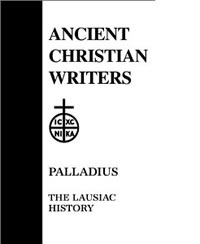Book Notes
 Palladius, The Lausiac History, translated and annotated by Robert T. Meyer (New York: Paulist Presss, 1964), 265pp.
Palladius, The Lausiac History, translated and annotated by Robert T. Meyer (New York: Paulist Presss, 1964), 265pp.
The Lausiac History by Palladius (c. 365–431) is one of a handful of important texts from which we gain an eyewitness knowledge of early Egyptian monasticism. The text gets its name from the person to whom it is dedicated; Lausus was a chamberlain for the emperor Theodosius II. Palladius himself had been a pupil of the famous desert dweller Evagrius of Pontus. Similar in style and content to the Lives of the Desert Fathers written in the late fourth century, the Lausiac History contains seventy-one biographical "chapters" on desert ascetics in Egypt, Palestine, Syria and even Asia Minor.
The text is written for us, says Palladius, so that we might "emulate and imitate" those early monks in their journey to the kingdom of heaven. But his very first paragraph includes a startling addition. He records the lives of not only the desert fathers but also of the desert mothers or ammas. "It is written also to commemorate women far advanced in years and illustrious God-inspired mothers who have performed feats of virtuous asceticism in strong and perfect intention, as exemplars and models for those women who wish to wear the crown of self-abnegation and chastity." These "holy highborn women," writes Palladius, "lived the best and loftiest lives." Unlike the Lives of the Desert Fathers, Palladius introduces us to several dozen women renunciants.
One writer speaks of the "huge silence" of the desert, but the Lausiac History also demonstrates the sheer scale and scope of early monasticism. There were hundreds of hermitages, large and small, that served tens of thousands of mothers and fathers. Palladius describes their bustling bakeries, tailors, metal workers, shoemakers, weavers, gardeners, carpenters, camel drivers, doctors, fullers, scribes, liturgies, and steady stream of visitors: "They work at every sort of handicraft and from their surplus they provide for the monasteries of women and the prison." Former slaves, extraordinarily wealthy women like Melania, the blind Didymus, learned scholars, business merchants, a cripple named Eulogius, a rustic herdsman named Paul, palace dignitaries like Innocent, a robber named Capiton — all these and many more grace these pages. They witness to a way of life that feels both strangely ancient but nevertheless attractive, renouncing all in order to gain all.


